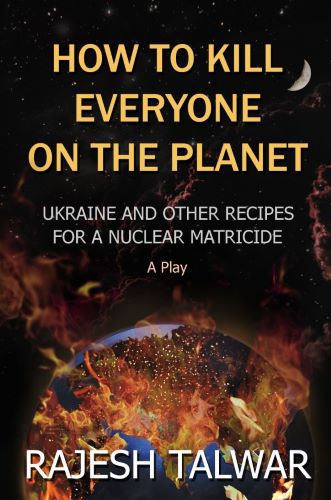Team L&M
As the Russia-Ukraine war enters its fourth month and the story of devastation and displacement continues to unfold, UN Legal Affairs Officer and writer Rajesh Talwar has come out with a thought-provoking and deeply troubling play-write concerning the survival of our planet in a conflict-ridden world. Titled How to Kill everyone on the Planet: Ukraine and other recipes for a Nuclear Matricide (Bridging Borders), the book is slated to release on June 24.
The author has used fictional as well as real-life scenarios to spark an important global debate. A thought-provoking and deeply troubling read, the book takes a satirical and philosophical look at the possibility of a tragedy beyond all others.
Excerpts from the book (Page 18-20)
Innumerable Hollywood films have been made with a plot that envisages the destruction of our planet. A Western hero, James Bond, or some other American variant, somehow manages to prevent this from happening. The earliest film that comes to my mind, in this genre, is the 1964 film ‘Goldfinger’ where the villain plans to blackmail the US government by using the threat of a ‘dirty’ nuclear bomb that he has managed to get hold of.
A great irony of cinema on these lines is how it is often inter-galactic and narrowly nationalistic at the same time – with an evil, enemy nation such as Russia or Germany. Then there are the movies that have been made which envisage actual destruction, partial or complete, of the planet. Sometimes the planet itself is destroyed but there is a habitation that miraculously hovers above it. Various permutations and combinations have been experimented with here; these are formulaic films, not so very different from each other. Humans appears to have an insatiable appetite for viewing violence and suffering, and Hollywood supplies us with disaster films one after the other. Do human relish war, violence and conflict, and find ‘peace’ too boring?
Truth, they say, is stranger than fiction and so we have former sci-fi addict Elon Musk, one of the richest men on the planet and the new owner of the social networking site Twitter, explain that part of the reason he is investing hundreds of millions of dollars in journeying to Mars is to explore the possibility of creating human settlements there. Mr Musk fears that Earth, his favourite planet, may soon be destroyed through our collective madness. In other words, through his cosmic outreach programme, there will, at least, be the possibility of human life surviving somewhere, albeit on another planet. Elon Musk is not saying anything new here; the American cosmologist Carl Sagan raised similar arguments a quarter century earlier.
There are other billionaires such as Bill Gates, who suggest that by spending billions on the Mars enterprise, Musk is not putting his money to good use, although he never says so directly. ‘Why look for water on Mars,’ Bill appears to argue, ‘instead of investing in finding water in dry areas on Earth itself?’ In an interview when questioned whether he himself would consider undertaking a journey to Mars should it become possible in his lifetime, Gates declined. Bill Gates claimed to be satisfied with remaining on earth and trying to combat malaria and other diseases and do good in other ways; this for him was much more
satisfying and challenging. Warren Buffet, who was his companion in the same interview, joked about how it was good enough for him if he crossed the lake that lay across his house! Is Elon Musk being paranoid then? The Russians would not appear to think so. A Russian general observed that the use of nuclear weapons was inevitable if a third World War broke out.4 Is there any truth to this general’s assertion, or was he bluffing?
